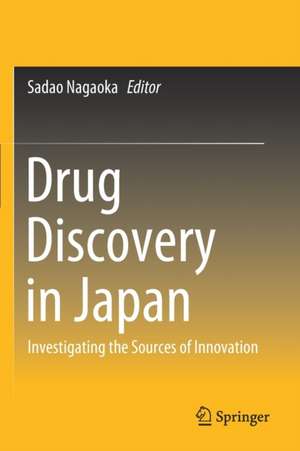Drug Discovery in Japan: Investigating the Sources of Innovation
Editat de Sadao Nagaokaen Limba Engleză Paperback – 6 noi 2020
| Toate formatele și edițiile | Preț | Express |
|---|---|---|
| Paperback (1) | 530.25 lei 6-8 săpt. | |
| Springer Nature Singapore – 6 noi 2020 | 530.25 lei 6-8 săpt. | |
| Hardback (1) | 705.83 lei 6-8 săpt. | |
| Springer Nature Singapore – 6 noi 2019 | 705.83 lei 6-8 săpt. |
Preț: 530.25 lei
Preț vechi: 623.83 lei
-15% Nou
Puncte Express: 795
Preț estimativ în valută:
101.49€ • 104.59$ • 85.68£
101.49€ • 104.59$ • 85.68£
Carte tipărită la comandă
Livrare economică 01-15 martie
Preluare comenzi: 021 569.72.76
Specificații
ISBN-13: 9789811389085
ISBN-10: 981138908X
Pagini: 333
Ilustrații: XV, 333 p. 57 illus., 33 illus. in color.
Dimensiuni: 155 x 235 mm
Greutate: 0.49 kg
Ediția:1st ed. 2019
Editura: Springer Nature Singapore
Colecția Springer
Locul publicării:Singapore, Singapore
ISBN-10: 981138908X
Pagini: 333
Ilustrații: XV, 333 p. 57 illus., 33 illus. in color.
Dimensiuni: 155 x 235 mm
Greutate: 0.49 kg
Ediția:1st ed. 2019
Editura: Springer Nature Singapore
Colecția Springer
Locul publicării:Singapore, Singapore
Cuprins
Foreword.- Acknowledgement.- Chapter 1: Introduction.- Chapter 2: Compactin.- Chapter 3: Pravastatin (Pravachol, Mevalotin).- Chapter 4: Rosuvastatin(Crestor).- Chapter 5: Leuprorelin (Leuplin, Lupron, Viadur).- Chapter 6: Oflaxacin and levofloxacin (Tarivid/Cravit).- Chapter 7: Tamsulosin (Harnal, Flomax, OMNIC).- Chapter 8: Pranlukast (Onon).- Chapter 9: Tacrolimus (Prograf).- Chapter 10: Pioglitazone (Actos, Glustin).- Chapter 11: Donepezil (Aricept).- Chapter 12: Candesartan (Blopress, Atacand).- Chapter 13: Tocilizumab (Actemra,Ro-actemra).- Chapter 14: Nivolumab (Opdivo).- Chapter 15: Sources of innovation of drug discovery in Japan and its implications.
Notă biografică
Dr. Sadao Nagaoka is a Professor of economics at Tokyo Keizai University (Japan). Before this position, he was a professor at the Institute of Innovation Research of Hitotsubashi University (Japan). He has been the Program Director for research on innovation in the Research Institute of Economy, Trade and Industry (RIETI). He worked in the MITI, the World Bank and in the OECD. He has been an economic advisor for the JPO and was a member of the Economic and Scientific Advisory Board of the EPO. He has a Ph.D. in Economics from Massachusetts Institute of Technology. His scientific interests are economics of innovation, especially R&D, intellectual property, standards and science. His recent publications appeared in Journal of Economics & Management Strategy, International Journal of Industrial Organization, Research Policy, Economics of Innovation and New Technology, Journal of Technology Transfer, Journal of the Japanese and International Economies and the US National Academies.
Textul de pe ultima copertă
This book analyzes the drug-discovery process in Japan, based on detailed case studies of 12 groups of 15 innovative drugs. It covers the first statin in the world up to the recent major breakthrough in cancer therapy, the recent immune checkpoint inhibitor, the scientific discovery for which a 2018 Nobel Prize in Physiology or Medicine was awarded to Prof. Tasuku Honjo, Kyoto University. The book shows the pervasive high uncertainty in drug discovery: frequent occurrences of unexpected difficulties, discontinuations, serendipities, and good luck, significantly because drug discovery starts when the underlying science is incomplete. Thus, there exist dynamic interactions between scientific progress and drug discovery. High uncertainty also makes the value of an entrepreneurial scientist high. Such scientists fill the knowledge gaps by absorbing external scientific progress and by relentless pursuit of possibilities through their own research, often including unauthorized research, to overcome crises. Further, high uncertainty and its resolution significantly characterize the evolution of competition in the drug industry. The patent system promotes innovation under high uncertainty not only by enhancing appropriability of R&D investment but also by facilitating the combination of knowledge and capabilities among different firms through disclosure. Understanding such a process significantly benefits the creation of innovation management and policy practices.
Caracteristici
Provides detailed accounts of drug discoveries in Japan, from statins to Opdivo, not well understood outside Japan Explains that science is often incomplete when discovery starts, requiring sustained knowledge absorption and pursuit of possibilities Shows the contributions of Japanese management: investment in human capability, long-term perspective, and delegation
